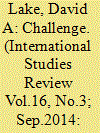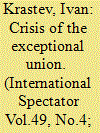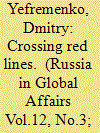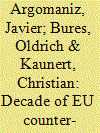|
|
|
Sort Order |
|
|
|
Items / Page
|
|
|
|
|
|
|
| Srl | Item |
| 1 |
ID:
134566


|
|
|
|
|
| Summary/Abstract |
This article argues that long-term changes in Turkish foreign policy are primarily due to the diversification of the country's political and economic interests. Important international structural shifts such as the end of the Cold War or the broad fluctuations in oil prices have constituted the initial impetus for the changes that we have seen in Turkish policies. Discussing alternative perspectives on new activism in Turkish foreign policy, the article gauges Turkey's foreign policy affinity (based on voting patterns in the United Nations General Assembly) and trade with other states to place recent trends in the broader context of the past three decades. It shows that, as the “West” has become less coherent in its policies, Turkey has moved closer to EU members and distanced itself from the US. The data also undermine “shift of axis” arguments as Turkey's foreign policy affinity with Middle Eastern countries has, in fact, declined. The trade data reveal a diversification of the country's commercial interests that contribute to Turkey's increasing regional activism. The country now balances its long term European interests with its recent regional ones.
|
|
|
|
|
|
|
|
|
|
|
|
|
|
|
|
| 2 |
ID:
136939


|
|
|
|
|
| Summary/Abstract |
Europe is a profoundly flexible concept and, in Ernesto Laclau’s terms, a ‘floating signifier’ which is given various meanings depending on the speaker’s political aims. The article focuses on current populist and nationalist political discourses in Finland and the articulation of Europe and European identity in the political rhetoric of The Finns Party. In the rhetoric, Europe is given contradictory meanings. On the one hand, it is perceived as a cultural and value-based community which shares a common (Christian) heritage and values. Identification with Europe and the promotion of European communality are particularly pronounced when a threat towards ‘us’ is experienced as coming from outside the imagined European borders. On the other hand, the European integration process and Europe as a political project can be articulated as threats not only to national independence, identity and cultural particularity but to European cultural identity as well.
|
|
|
|
|
|
|
|
|
|
|
|
|
|
|
|
| 3 |
ID:
134961


|
|
|
|
|
| Summary/Abstract |
This special issue of the Asia Europe Journal focuses on a triangulated conversation between scholars working in/on Asia, Europe and Australia. The essays showcase the work of early career researchers involved in the EU-Oceania Social Science Inter-regional Consortium (EUOSSIC) Erasmus Mundus exchange programme that links leading universities in Europe1 with those in Australia2 and New Zealand3 to promote the study of European Union (EU) external relationships. Erasmus Mundus was launched in 2004 and is funded by the Education and Culture Directorate General of the European Commission with the objectives of enhancing the quality of European higher education and the promotion of dialogue and understanding between people and cultures through cooperation with third countries. The aim of the EUOSSIC Erasmus Mundus exchange programme (2011–2013) is to build on existing connections to create a formal programme of inter-regional exchanges between the EU and Oceania for doctoral and post-doctoral scholars as well as academic staff with a Social Science background. In total, 61 doctoral students, 11 post-doctoral fellows and 27 academic staff were involved in the EUOSSIC Erasmus Mundus programme.
|
|
|
|
|
|
|
|
|
|
|
|
|
|
|
|
| 4 |
ID:
136493


|
|
|
|
|
| Summary/Abstract |
Russia’s annexation of Crimea and ongoing efforts to de-stabilize Eastern Ukraine have led NATO and the US to adopt a number of initiatives aimed at “reassuring” Eastern and Central European allies. This article assesses the implications of those initiatives for NATO’s evolving position in Eastern Europe. It also appraises the Alliance’s renewed focus on defense and deterrence with respect to European and transatlantic capabilities.
|
|
|
|
|
|
|
|
|
|
|
|
|
|
|
|
| 5 |
ID:
136868


|
|
|
|
|
| Summary/Abstract |
This article critically examines the use and effectiveness of border controls in the European Union (EU)'s counter-terrorism policy. It shows that the EU has made substantial progress towards achieving the objectives that it had set for itself in this policy area, but has not managed to fulfil all of them, and certainly not by the deadlines originally set. It further argues that, contrary to their usual depiction in EU official documents, these border control measures make a limited contribution to the actual fight against terrorism, whilst having some negative effects. From that viewpoint, the fact that the EU has failed to meet all of its objectives in the use of border controls for counter-terrorist purposes may paradoxically be seen as a positive outcome.
|
|
|
|
|
|
|
|
|
|
|
|
|
|
|
|
| 6 |
ID:
135896


|
|
|
|
|
| Summary/Abstract |
In the US context, scholars have demonstrated that public support for military intervention is influenced by the elite debate as presented in the national news media and that the volume of elite criticism reported is largely determined by opposition in Congress. Because the media “index” the debate among officials in Washington, a lively and comprehensive airing of the pros and cons of a military intervention often depends upon Congressional leaders taking an oppositional stance. But sometimes, American reporters will incorporate a surge of foreign leaders' critical views, even when Congressional leaders support administration policy or when they choose to remain silent due to strategic considerations. The question addressed by this article is whether such departures from traditional indexing behavior—which bring foreign views into media coverage in a significant manner—can be predicted based on the circumstances and journalists' incentives. The article also explores whether high-visibility opposition by credible foreign leaders, in particular United Nations officials and European allies, can substitute for partisan cues from domestic leaders and invigorate a national debate in a manner that influences public opinion.
|
|
|
|
|
|
|
|
|
|
|
|
|
|
|
|
| 7 |
ID:
134626


|
|
|
|
|
| Summary/Abstract |
This paper compares how officials in Rousse, Bulgaria, and Transcarpathia, Ukraine, interact with ‘foreigners’: officials from agencies of the European Union (EU), other member states, and foreign consultants. The goals are: a) to compare the extent to which officials in the two communities participate in transnational networks of European bureaucracies, the so-called ‘transnational fusion bureaucracy’; b) to assess the ways in which the bottom-up actions of those officials relate to the broad, top-down policy goals of the EU; and c) to analyse the effects of those interactions on the business environments of the two communities. As a result of comparing the two regions, this paper argues that similar processes of integration in the transnational fusion bureaucracy occur in the internal periphery of the European Union (Rousse) and in areas outside the EU borders (Transcarpathia). In doing so, it questions the extent to which both regions participate in an emerging ‘transnational fusion bureaucracy’ emphasising difference in intensity of the considered processes, as well as the different responses by the two bureaucracies to inputs and opportunities provided by the EU.
|
|
|
|
|
|
|
|
|
|
|
|
|
|
|
|
| 8 |
ID:
137045


|
|
|
|
|
| Summary/Abstract |
This article examines the performance of the European Union (EU) in the International Atomic Energy Agency (IAEA). Following Barnett and Finnemore, the article argues that the EU as an intergovernmental organization (IO) possesses bureaucratic power based on high technical knowledge and rational–legal authority that it can use to gain influence in the Agency. The EU uses its technical knowledge to be a first-mover in political and technical discussions, and uses its financial support to influence the Agency's technical standards and practices for nuclear safeguards, security, and safety. Nevertheless, the analysis shows that its rational–legal authority as an international organization is limited. Being a regional IO, it does not automatically possess the impartiality and hence legitimacy that ordinarily characterize an international organization. Thus, to further improve its performance in the IAEA, the EU must look beyond internal policy issues and focus on its external legitimacy and standing as well.
|
|
|
|
|
|
|
|
|
|
|
|
|
|
|
|
| 9 |
ID:
135401


|
|
|
|
|
| Summary/Abstract |
Amid the buzz around new US and EU sanctions being imposed on Russia, sanctions on another country, on the other side of the world, were being gently lifted. In October, following elections, America and Australia removed all remaining sanctions on Fiji, which had included travel bans for top officials, an embargo on arms sales and limits on financial assistance.
The sanctions can be at least partly credited for holding President Frank Bainimarama, the retired rear admiral who seized power in a bloodless 2006 coup, to his promise of holding elections in 2014, albeit having failed to persuade him to move the timetable forward.
|
|
|
|
|
|
|
|
|
|
|
|
|
|
|
|
| 10 |
ID:
134475


|
|
|
|
|
| Summary/Abstract |
In recent years, the European Union has supported the development of a new civil security market, capable of providing security technology for new and global security challenges. This article analyses the emerging growth market for civil security in relation to contemporary notions of potential crisis and emergency. Building on ongoing academic analysis of what Melinda Cooper has termed ‘economies of emergence’, the article points out how the figure of emergence generates investment in more flexible, adaptive and, so it is argued, potentially lucrative markets for civil security. Drawing on observations at a number of security trade shows and stakeholder workshops, the analysis demonstrates that ‘civil’ aspirations, concepts and technologies build on earlier formulations of military strategic discourse in the so-called Revolution in Military Affairs – though in complex and sometimes contradictory ways. More generally, the motivation behind the analysis is to investigate civil security and civil markets as performative enactments, and so to critically engage with the emergence of the civil security market as a priority in EU policymaking.
|
|
|
|
|
|
|
|
|
|
|
|
|
|
|
|
| 11 |
ID:
134496


|
|
|
|
|
| Summary/Abstract |
Economic and political power within the international system is becoming more diffuse. Nonetheless, China is today the principal challenger to the United States (Mansfield, this issue). The European Union (EU) remains an economic powerhouse, but is currently plagued by problems centering on the euro and the austerity Germany and the fixed exchange rate regime have imposed on the continent. Europe has also shown little interest in challenging the United States in past decades and, in fact, has been a stalwart supporter of American hegemony for nearly 70 years. Japan remains the world's third largest economy and fourth largest trader, and after decades of stagnation may finally be on the road to economic recovery. Yet, it too remains a supporter of continued American leadership. Brazil, Russia, and India have garnered much attention recently but still rank low on the scale of economic power, whether measured by GDP or trade (Mukherji, this issue). China is the world's second largest economy and largest trader. By any measure, it is the only country likely to overtake the United States in the near future, although its ability to do so is not a foregone conclusion. The distribution of international power may soon return to bipolarity.
|
|
|
|
|
|
|
|
|
|
|
|
|
|
|
|
| 12 |
ID:
135920


|
|
|
|
|
| Summary/Abstract |
The personnel structure and recruitment of armed forces represent major elements of civil-military relations and civilian control. Particularly crucial is the moment of shift from one type of recruitment to another and the factors that facilitate or impede it. The focus of this paper is the case of the Russian Federation during the Medvedev presidency, when renewed efforts were made to cut back conscription in favor of a professional contract-based force. Despite crucial incidents, such as the 2008 Russian-Georgian War that spelled out once more the prevailing inertia of the Russian conscript-based army, military elites have been opposed to a change of the status quo. By analyzing exemplary ideational discourses based on the discursive institutional approach, factors will be elaborated that explain what continues to impede the shift to contract-based recruitment in Russia. In the light of the latest hostilities between Russia and NATO, the prospect of this shift has receded even further into the distance.
|
|
|
|
|
|
|
|
|
|
|
|
|
|
|
|
| 13 |
ID:
137085


|
|
|
|
|
| Summary/Abstract |
In contrasting UN with EU democracy promotion discourses, the article contributes to the debate on the substance of EU democracy promotion by approaching the question of ‘democratic substance’ from the vantage point of sovereignty. For its analytical framing, it draws on relevant aspects of Foucault's work on power. The article suggests that, due to their diverging obligations to sovereignty, the substance of democracy promotion in UN discourses revolves around an institutional-centric understanding, whereas in EU discourses we see a significant reconceptualization of democracy as a norms-based concept. The latter does not aim at the government of society but the ethical self-governance of socially embedded individuals. It is argued that, with the decreasing purchase of democracy as a universal political project and the growing concern with local contexts, the EU's norms-based conception emerges as better equipped to adapt to contemporary challenges of governing. The article concludes with raising some doubts about the democratic promise and potential of the democratic rationality underpinning EU discourses. Democracy, participation and political change are no longer conceived in terms of shaping and influencing public agenda but refer to socially shaping and influencing subjective perceptions and behaviours.
|
|
|
|
|
|
|
|
|
|
|
|
|
|
|
|
| 14 |
ID:
137087


|
|
|
|
|
| Summary/Abstract |
This piece examines the substance of EU democracy promotion from a comparative point of view and from a perspective placing under inquiry the meaning of the idea of liberal democracy itself. Instead of assuming that the democratic ideal that the EU promotes (‘liberal democracy’) has a clear, fixed meaning, the article examines in detail what actually constitutes the ‘ideal of democracy’ at the heart of EU democracy promotion, and compares this vision to that which informs the democracy promotion of the US. It argues that interesting differences, and shifts and oscillations, in the models of liberal democracy that the EU and the US promote exist and that these are important to note in order for us to fully appreciate how the substance of EU and US democracy support can be shaped by conceptual and ideological debate on the meaning of democracy. This dynamic is particularly relevant today, in the context of the recent attempts to develop transatlantic dialogue on democracy support. This dialogue, it is suggested, plasters over some subtle but important ideological cracks over what is meant by democracy in EU and US democracy support.
|
|
|
|
|
|
|
|
|
|
|
|
|
|
|
|
| 15 |
ID:
136872


|
|
|
|
|
| Summary/Abstract |
In this article we seek to address the emerging role of the European Union (EU) as a security and intelligence actor from the perspective of counter-terrorism. Intelligence as a process and product has been strongly promoted by the EU as a useful and necessary tool in the fight against terrorism, radicalization, organized crime and public order problems. A range of agencies has been established that collect, analyze and operationalize intelligence in view of strategically defined security threats. Examples are Europol and Frontex. This article makes an inventory of their roles and competences in the field of intelligence and looks at the list of instruments that encourage the sharing of intelligence between different law enforcement and security agencies. Moreover, it is argued in this article that as intelligence becomes more hybrid and as the EU only holds light powers of oversight on ownership and integrity of data, considerable governance challenges lurk around the corner. As ‘intelligence’ is usually a complex and sensitive product, it often travels outside formal bureaucratic channels, which undermines accountability and transparency of where, how and for what purpose the intelligence was gathered.
|
|
|
|
|
|
|
|
|
|
|
|
|
|
|
|
| 16 |
ID:
135300


|
|
|
|
|
| Summary/Abstract |
The European elections failed to mobilise public support for the European project. Despite the strong showing of populist parties in the European Parliament, there are indications that the European Union would rather be transformed than destroyed by the current political crisis.
|
|
|
|
|
|
|
|
|
|
|
|
|
|
|
|
| 17 |
ID:
134255


|
|
|
|
|
| Summary/Abstract |
This article discusses the potential of Critical Discourse Analysis (CDA) for the study of EU foreign policy and argues that CDA can provide a systematic way of studying discourses on EU foreign policy through the refined linguistic and argumentative tools that it offers. The article first outlines the main theoretical premises of CDA and its one particular variant, the discourse-historical approach, and then presents a discussion on its analytical and methodological toolkit. After discussing the various ways in which EU foreign policy texts can be subject to CDA, the article concludes with the theoretical challenges posed by CDA, particularly regarding its relationship with poststructuralist approaches to foreign policy.
|
|
|
|
|
|
|
|
|
|
|
|
|
|
|
|
| 18 |
ID:
134546


|
|
|
|
|
| Summary/Abstract |
The Ukrainian crisis is just ushering in a series of conflicts amid which a polycentric system of international relations will form. An effective multilateral mechanism must be created for preventing and settling crises in Europe and North Eurasia.
|
|
|
|
|
|
|
|
|
|
|
|
|
|
|
|
| 19 |
ID:
134543


|
|
|
|
|
| Summary/Abstract |
The European Union’s sovereign debt and banking crisis has made apparent a gnawing gap between the northern and southern parts of Europe. Over the course of this past half decade, this divide has been brought into the public debate through a myriad of perspectives, from social trust to competitiveness. Yet, the governance sources of the divide are underestimated in policy practices and misrepresented in the political discourse. A governance approach can help clarify why the pursuit of convergence underpinning EU crisis-resolution mechanisms has become a contributing factor, rather than a prospective solution to the North-South gap. In doing so, governance also forms the basis for recommendations to policymakers in both halves of the continent, especially when confronted with the challenge of populist Euroscepticism.
|
|
|
|
|
|
|
|
|
|
|
|
|
|
|
|
| 20 |
ID:
136863


|
|
|
|
|
| Summary/Abstract |
The Treaty on the European Union (EU) stipulates that one of the key objectives of the Union is to provide citizens with a high level of safety within an Area of Freedom, Security and Justice (AFSJ). Given that the fight against terrorism is a prominent aspect of this general objective, it is remarkable that, in spite of its political relevance and decade-long history, it has only relatively recently received due attention in the academic community.1 At the time of writing, only a handful of post-9/11 edited volumes and special issues have focused on specific aspects of the EU counterterrorism efforts2 and initial monographs on the subject have only been relatively recently published by the three editors behind this special issue: Argomaniz3 has produced a theoretically informed assessment of the coherence of the EU response, Bures4 has examined the extent to which the EU can offer an added value in the fight against terrorism in Europe and Kaunert5 has studied how counter-terrorism has been a driver in the process of construction of the EU's AFSJ.
|
|
|
|
|
|
|
|
|
|
|
|
|
|
|
|
|
|
|
|
|